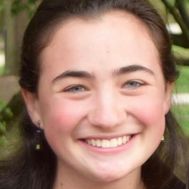|
Congratulations to the recipients of the Fall 2017 Ernest N. Cory Undergraduate Scholarship! This scholarship provides up to $1,000 for undergraduate students each semester who have creatively contributed to Entomology Department research and/or extension efforts. Be sure to check back in the Fall to read more about their research progress!  ABIGAIL TORETSKY, Palmer Lab, Undergraduate Research Assistant Abigail's early work in the Palmer Lab consisted of sorting laboratory materials, discussing primary literature on wetland hydrology and biogeochemistry with graduate students, and assisting with the construction of field equipment. This work gave her a better understanding of how the lab uses raw field data to draw conclusions about wetland gas flux. This summer, Abigail plans to collect and analyze water samples after a storm from a wetland, nearby streams, and ground water in order to determine possible sources of ion flow into the wetland. Based on differences in the ion concentrations in these different areas, these data will hopefully help define the role of the wetland in the overall watershed.  JESSICA HERNANDEZ, Pick Lab, Undergraduate Research Assistant While the Pick Lab traditionally uses Drosophila melanogaster to investigate the regulatory genes and pathways that control embryonic development – with an emphasis on pair rule genes – Jessica’s work in the lab focuses on orthologous pair rule genes in Oncopeltus fasciatus, an intermediate germband insect. Under the guidance of Pick Lab postdocs and graduate students, she has been able to isolate a new gene from O. fasciatus using a variety of molecular techniques, including PCR, TA cloning, and DNA sequencing. Ultimately, Jessica would like to attend professional school where she can complete an MD program in Emergency Medicine.  MERVIN CUADERA, Fritz Lab, Undergraduate Research Assistant Knowing the important role that mosquitos play in disease transmission, Mervin thought working with Dr. Fritz would be both interesting and relevant to greater societal problems. Apart from rearing mosquitoes, Mervin is involved in a study of the effects of blood feeding source on fitness in Culex pipiens and C. molestus. Previous work suggests that C. pipiens prefers avian blood, while C. molestus prefers mammalian blood, leading to the prediction that preferred blood sources confer the highest fitness as measured by the number of eggs produced. Early results suggest that both strains, instead, have higher fitness when feeding on avian blood. Early on, the Fritz Lab found it hard to count eggs accurately due to significant (and often nauseating) motion under the microscope. Therefore, Mervin suggested that they mount a camera on the scope to improve counting accuracy. The success of this approach has made it standard protocol for this research project.  VICTOR SETTLES, Gruner Lab, Undergraduate Research Assistant Victor has been impressed by the diversity of insects since he was a child. After taking an entomology course this past spring and reading deeper into the primary literature, he pursued an undergraduate research position in Dr. Dan Gruner’s Lab. He now works under the guidance of Elske Tielens, a Gruner Lab BEES graduate student. His major tasks involve sorting, identifying, and curating arthropod samples from the Hawaiian Islands in order to assist Elske in investigating the effects of invasive predators on canopy insect communities in forests fragmented by lava flows and how these communities assemble over evolutionary time. Victor hopes to use his experience in the Gruner lab working with dichotomous keys and learning to develop hypotheses about ecology and evolution to build a foundation in research that will ultimately set him on a path towards a career as a Principle Investigator. Comments are closed.
|
Categories
All
Archives
June 2024
|
Department of Entomology
University of Maryland
4112 Plant Sciences Building
College Park, MD 20742-4454
USA
Telephone: 301.405.3911
Fax: 301.314.9290
University of Maryland
4112 Plant Sciences Building
College Park, MD 20742-4454
USA
Telephone: 301.405.3911
Fax: 301.314.9290

 RSS Feed
RSS Feed




